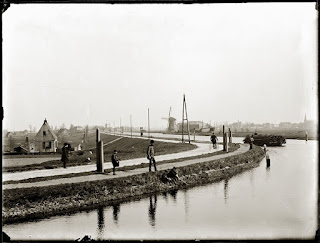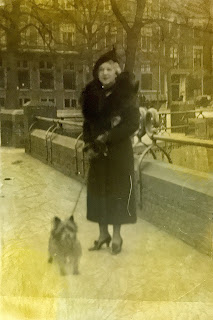Music
Week 29 of 52 Ancestors in 52 Weeks should be fun -- the theme is "Music"! Any musical ancestors? What about an ancestor with a musical name?
Music is now all around us if you want to listen, streaming with spotify, Itunes, etc, but our ancestors had to go someplace to hear music or make it themselves.
My earliest ancestors (that I have records for) were farmers, shepherds, laboureres, or barge skippers; this is late 17th, early 18th century. Music in their lives would be at church, singing hymns, or family celebrations like weddings. They might have played a musical instrument but considering their lifestyle, not likely. Maybe a violin or harmonica if that existed, but really I don't know.
The piano is the instrument of choice in our family. My mother played piano, as did her mother Meta, and I still play. Recently I discovered that my grandfather Rein Peelen, also played piano.
Another pianist in the family emerges from the letters by Jan Peelen, writing from Cairo, Egypt, in 1859. He ordered a piano from Amsterdam for his wife Anna Knoops, who would play every evening. Would she already have known about Chopin's works, the waltzes, or was she only familiar with Mozart, Haydn?
Family lore has that my great grandmother Johanna Cornelia Bronke loved going out to Amsterdam's Concert Gebouw (Concert Hall) with her two boys to matinee performances.
Her uncle Gerrit Nicolaas Bronke was the church organist for forty years at the Nederlands Hervormde Kerk (Dutch Reformed Church) Zaandijk. He retired on 7 February 1920 and handed the position over to a former student. This is related in a photocopy of a paper cutting (pictured) which is dated but does not identify the paper it came from.
My father loved music and built up a record collection displaying an eclectic taste ranging from classical to jazz, country and pop. He would play his latest and favourite records on Sundays. The story goes that as a boy aged about fourteen, he would ride up and down his street, with his record player mounted on the back of his bike, playing records and getting paid for it!
On the other hand, his mother Bé Blomberg-Lawerman, denied being musical in any way and could name only one song that she might call a favourite - The Ehre Gottes aus der Natur
by Beethoven. Although she could hum the the first lines.
In Amsterdam of the 1950's and 60's one could hear the Draaiorgel - street organ - around the streets. Think of a small pipe organ mounted on wheels and this would be pushed by a couple of men, playing all kinds of music from operas, classics to popular songs of the day. When it came down our street Oma Blomberg would send me out with some coins for them. It always had a festive sound. It was 'powered' by turning a large wheel which fed a roll through the innards, like a player piano. https://nl.wikipedia.org/wiki/Draaiorgel
Music is now all around us if you want to listen, streaming with spotify, Itunes, etc, but our ancestors had to go someplace to hear music or make it themselves.
My earliest ancestors (that I have records for) were farmers, shepherds, laboureres, or barge skippers; this is late 17th, early 18th century. Music in their lives would be at church, singing hymns, or family celebrations like weddings. They might have played a musical instrument but considering their lifestyle, not likely. Maybe a violin or harmonica if that existed, but really I don't know.
 |
| Meta Reith, at her piano, aged about 14. Photo from family collection. |
Another pianist in the family emerges from the letters by Jan Peelen, writing from Cairo, Egypt, in 1859. He ordered a piano from Amsterdam for his wife Anna Knoops, who would play every evening. Would she already have known about Chopin's works, the waltzes, or was she only familiar with Mozart, Haydn?
Family lore has that my great grandmother Johanna Cornelia Bronke loved going out to Amsterdam's Concert Gebouw (Concert Hall) with her two boys to matinee performances.
Her uncle Gerrit Nicolaas Bronke was the church organist for forty years at the Nederlands Hervormde Kerk (Dutch Reformed Church) Zaandijk. He retired on 7 February 1920 and handed the position over to a former student. This is related in a photocopy of a paper cutting (pictured) which is dated but does not identify the paper it came from.
My father loved music and built up a record collection displaying an eclectic taste ranging from classical to jazz, country and pop. He would play his latest and favourite records on Sundays. The story goes that as a boy aged about fourteen, he would ride up and down his street, with his record player mounted on the back of his bike, playing records and getting paid for it!
On the other hand, his mother Bé Blomberg-Lawerman, denied being musical in any way and could name only one song that she might call a favourite - The Ehre Gottes aus der Natur
by Beethoven. Although she could hum the the first lines.
In Amsterdam of the 1950's and 60's one could hear the Draaiorgel - street organ - around the streets. Think of a small pipe organ mounted on wheels and this would be pushed by a couple of men, playing all kinds of music from operas, classics to popular songs of the day. When it came down our street Oma Blomberg would send me out with some coins for them. It always had a festive sound. It was 'powered' by turning a large wheel which fed a roll through the innards, like a player piano. https://nl.wikipedia.org/wiki/Draaiorgel





Comments
Post a Comment